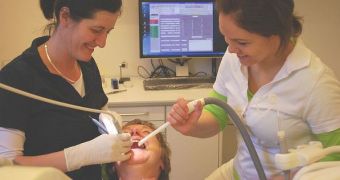Recent advancements in the fields of robotics mean that, soon, we could see robotic dentists meeting us inside specialized cabinets. Still, they will not totally take over the job of humans, experts believe, as there will always be someone there to tell you to open wide and relax. The years of education and hands-on experience that dentists have will remain irreplaceable, but robots could reach a point in their development when they will be able to carry out specialized and complex procedures, such as dental implants, PhysOrg reports.
According to Dr. Nicolas Elian, an oral surgeon specialized in implants, “There's no substitute for expert skill and clinical judgment. We, as the doctors, will still have to make the commitment” to the wellbeing of the patients. Elian is also the head of the implant division at the New York University College of Dentistry, and the president and chief executive officer of Vizstara. Vizstara is a private practice recently opened, which resembles more a futuristic spa and relaxation center than a dentist's office. The main goal of the clinic is to make patients feel comfortable the second they walk through the doors of the establishment.
Vizstara also provides advanced studies, training and mentoring for dentists and other healthcare experts, and is considered to be one of the best training centers available. In his daily treatments provided to the center's patients, Elian is already using a computerized 3D surgical navigation system, which enables him to get a close and detailed view of the areas that need intervention. The instrument is essentially able to analyze the topography of the teeth, and to guide the oral surgeon's hands and tools to the exact targeted place, without even minor deviations.
The entire mouth of the patients is scanned beforehand, and then displayed on a screen, so the expert always has the best possible view on what they need to do. “Navigation is quite a system. It is really one step before robotics,” Elian explains. It is not far-fetched to believe that, in the near future, these kinds of navigation systems will be attached to high-tech robotic arms that will essentially perform the job of the dentist based on a set of commands, without touching any nerve endings, and causing the patient much pain. And this could make going to the dentist's office a lot less scary for many people.
(c) 2009, North Jersey Media Group Inc.

 14 DAY TRIAL //
14 DAY TRIAL //